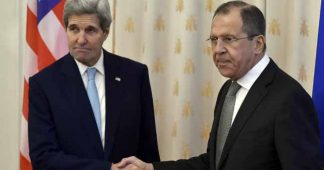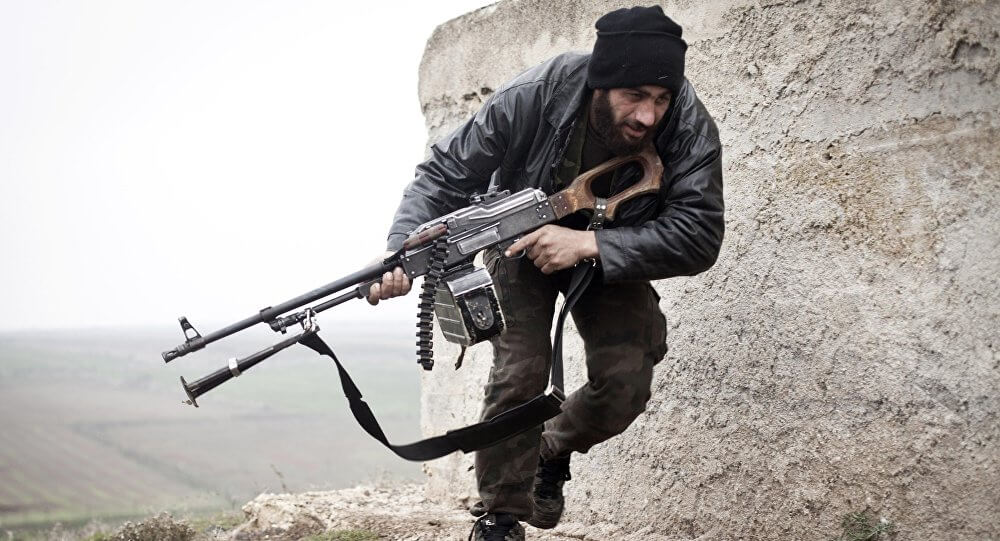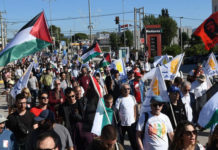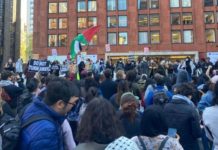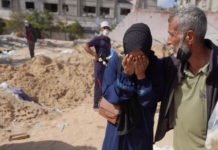Posing as a non-political solidarity organization, the Syria Campaign leverages local partners and media contacts to push the U.S. into toppling another Middle Eastern government.
By Max Blumenthal / AlterNet
October 2, 2016
On September 30, demonstrators gathered in city squares across the West for a “weekend of action” to “stop the bombs” raining down from Syrian government and Russian warplanes on rebel-held eastern Aleppo. Thousands joined the protests, holding signs that read “Topple Assad” and declaring, “Enough With Assad.” Few participants likely knew that the actions were organized under the auspices of an opposition-funded public relations company called the Syria Campaign.
By partnering with local groups like the Syrian civil defense workers popularly known as the White Helmets, and through a vast network of connections in media and centers of political influence, The Syria Campaign has played a crucial role in disseminating images and stories of the horrors visited this month on eastern Aleppo. The group is able to operate within the halls of power in Washington and has the power to mobilize thousands of demonstrators into the streets. Despite its outsized role in shaping how the West sees Syria’s civil war, which is now in its sixth year and entering one of its grisliest phases, this outfit remains virtually unknown to the general public.
The Syria Campaign presents itself as an impartial, non-political voice for ordinary Syrian citizens that is dedicated to civilian protection. “We see ourselves as a solidarity organization,” The Syria Campaign strategy director James Sadri told me. “We’re not being paid by anybody to pursue a particular line. We feel like we’ve done a really good job about finding out who the frontline activists, doctors, humanitarians are and trying to get their word out to the international community.”
Yet behind the lofty rhetoric about solidarity and the images of heroic rescuers rushing in to save lives is an agenda that aligns closely with the forces from Riyadh to Washington clamoring for regime change. Indeed, The Syria Campaign has been pushing for a no-fly zone in Syria that would require at least “70,000 American servicemen” to enforce, according to a Pentagon assessment, along with the destruction of government infrastructure and military installations. There is no record of a no-fly zone being imposed without regime change following —which seems to be exactly what The Syria Campaign and its partners want.
“For us to control all the airspace in Syria would require us to go to war against Syria and Russia. That’s a pretty fundamental decision that certainly I’m not going to make,” said Gen. Joseph Dunford, the chairman of the Joint Chiefs of Staff, at a hearing of the Senate Armed Services Committee this month.
While the military brass in Washington seems reluctant to apply the full force of its airpower to enforce a NFZ, The Syria Campaign is capitalizing on the outrage inspired by the bombardment of rebel-held eastern Aleppo this year to intensify the drumbeat for greater U.S. military involvement.
The Syria Campaign has been careful to cloak interventionism in the liberal-friendly language of human rights, casting Western military action as “the best way to support Syrian refugees,” and packaging a no-fly zone — along with so-called safe zones and no bombing zones, which would also require Western military enforcement — as a “way to protect civilians and defeat ISIS.”
Among The Syria Campaign’s most prominent vehicles for promoting military intervention is a self-proclaimed “unarmed and impartial” civil defense group known as the White Helmets. Footage of the White Helmets saving civilians trapped in the rubble of buildings bombed by the Syrian government and its Russian ally has become ubiquitous in coverage of the crisis. Having claimed to have saved tens of thousands of lives, the group has become a leading resource for journalists and human rights groups seeking information inside the war theater, from casualty figures to details on the kind of bombs that are falling.
But like The Syria Campaign, the White Helmets are anything but impartial. Indeed, the group was founded in collaboration with the United States Agency for International Development (USAID)’s Office of Transitional Initiatives, an explicitly political wing of the agency that has funded efforts at political subversion in Cuba and Venezuela. USAID is the White Helmets’ principal funder, committing at least $23 million to the group since 2013. This money was part of $339.6 million budgeted by USAID for “supporting activities that pursue a peaceful transition to a democratic and stable Syria” — or establishing a parallel governing structure that could fill the power vacuum once Bashar Al-Assad was removed.
Thanks to an aggressive public relations push by The Syria Campaign, the White Helmets have been nominated for the Nobel Prize, and have already been awarded the “alternative Nobel” known as the Right Livelihood Award. (Previous winners include Amy Goodman, Edward Snowden and Israeli nuclear whistleblower Mordechai Vanunu.) At the same time, the White Helmets are pushing for a NFZ in public appearances and on a website created by The Syria Campaign.
The Syria Campaign has garnered endorsements for the White Helmets from a host of Hollywood celebrities including Ben Affleck, Alicia Keyes and Justin Timberlake. And with fundraising and “outreach” performed by The Syria Campaign, the White Helmets have become the stars of a slickly produced Netflix documentary vehicle that has received hype from media outlets across the West.
But making the White Helmets into an international sensation is just one of a series of successes The Syria Campaign has achieved in its drive to oust Syria’s government.
Targeting the UN in Damascus
When an aid convoy organized by the Syrian Arab Red Crescent (SARC) and United Nations Office for the Coordination of Humanitarian Affairs came under attack on its way to the rebel-held countryside of West Aleppo in Syria this September 18, the White Helmets pinned blame squarely on the Syrian and Russian governments. In fact, a White Helmets member was among the first civilians to appear on camera at the scene of the attack, declaring in English that “the regime helicopters targeted this place with four barrel [bombs].” The White Helmets also produced one of the major pieces of evidence Western journalists have relied on to implicate Russia and the Syrian government in the attack: a photograph supposedly depicting the tail fragment of a Russian-made OFAB 250-270 fragmentation bomb. (This account remains unconfirmed by both the UN and SARC, and no evidence of barrel bombs has been produced).
Ironically, the White Helmets figured prominently in The Syria Campaign’s push to undermine the UN’s humanitarian work inside Syria. For months, The Syria Campaign has painted the UN as a stooge of Bashar Al-Assad for coordinating its aid deliveries with the Syrian government, as it has done with governments in conflict zones around the world. The Guardian’s Kareem Shaheen praised a 50-page report by The Syria Campaign attacking the UN’s work in Syria as “damning.” A subsequent Guardian’ article cited the report as part of the inspiration for its own “exclusive” investigation slamming the UN’s coordination with the Syrian government.
At a website created by The Syria Campaign to host the report, visitors are greeted by a UN logo drenched in blood.
The Syria Campaign has even taken credit for forcing former UN Resident Coordinator Yacoub El-Hillo out of his job in Damascus, a false claim it was later forced to retract. Among the opposition groups that promoted The Syria Campaign’s anti-UN report was Ahrar Al-Sham, a jihadist rebel faction that has allied with Al Qaeda in a mission to establish an exclusively Islamic state across Syria.
A Westerner who operates a politically neutral humanitarian NGO in Damascus offered me a withering assessment of The Syria Campaign’s attacks on the UN. Speaking on condition of anonymity because NGO workers like them are generally forbidden from speaking to the media, and often face repercussions if they do, the source accused The Syria Campaign of “dividing and polarizing the humanitarian community” along political lines while forcing humanitarian entities to “make decisions based on potential media repercussions instead of focusing on actual needs on the ground.”
The NGO executive went on to accuse The Syria Campaign and its partners in the opposition of “progressively identifying the humanitarian workers operating from Damascus with one party to the conflict,” limiting their ability to negotiate access to rebel-held territory. “As a humanitarian worker myself,” they explained, “I know that this puts me and my teams in great danger since it legitimizes warring factions treating you as an extension of one party in the conflict.
“The thousands of Syrians that signed up with the UN or humanitarian organizations are civilians,” they continued. “They not only joined to get a salary but in hopes of doing something good for other Syrians. This campaign [by The Syria Campaign] is humiliating all of them, labelling them as supporters of one side and making them lose hope in becoming agents of positive change in their own society.”
This September, days before the aid convoy attack prompted the UN to suspend much of its work inside Syria, The Syria Campaign spurred 73 aid organizations operating in rebel-held territory, including the White Helmets, to suspend their cooperation with the UN aid program. As the Guardian noted in its coverage, “The decision to withdraw from the Whole of Syria programme, in which organisations share information to help the delivery of aid, means in practice the UN will lose sight of what is happening throughout the north of Syria and in opposition-held areas of the country, where the NGOs do most of their work.”
Despite The Syria Campaign’s influence on the international media stage, details on the outfit’s inner workings are difficult to come by. The Syria Campaign is registered in England as a private company called the Voices Project at an address shared by 91 other companies. Aside from Asfari, most of The Syria Campaign’s donors are anonymous.
Also read
James Le Mesurier: The Former British Mercenary Who Founded The White Helmets
“First Responder” White Helmets Reemerge as Experts in Defusing Explosives in Syria’s Afrin
Published at https://www.alternet.org/world/inside-shadowy-pr-firm-thats-driving-western-opinion-towards-regime-change-syria


